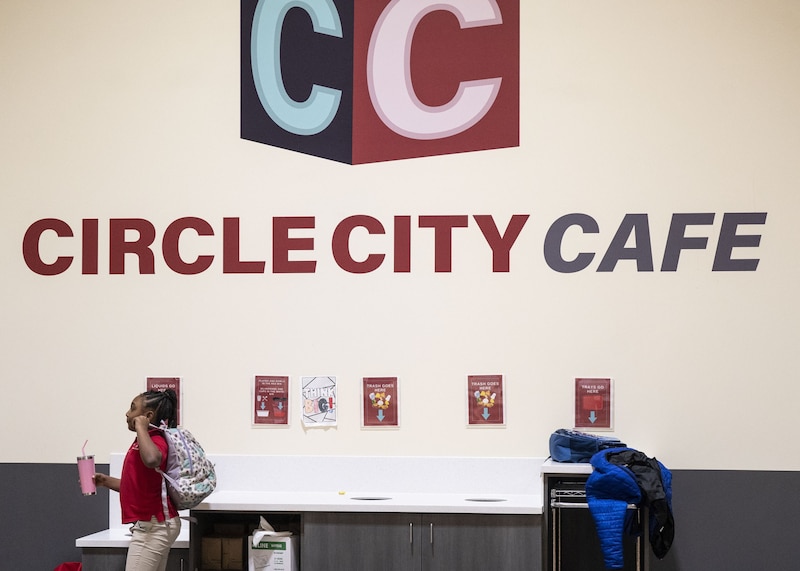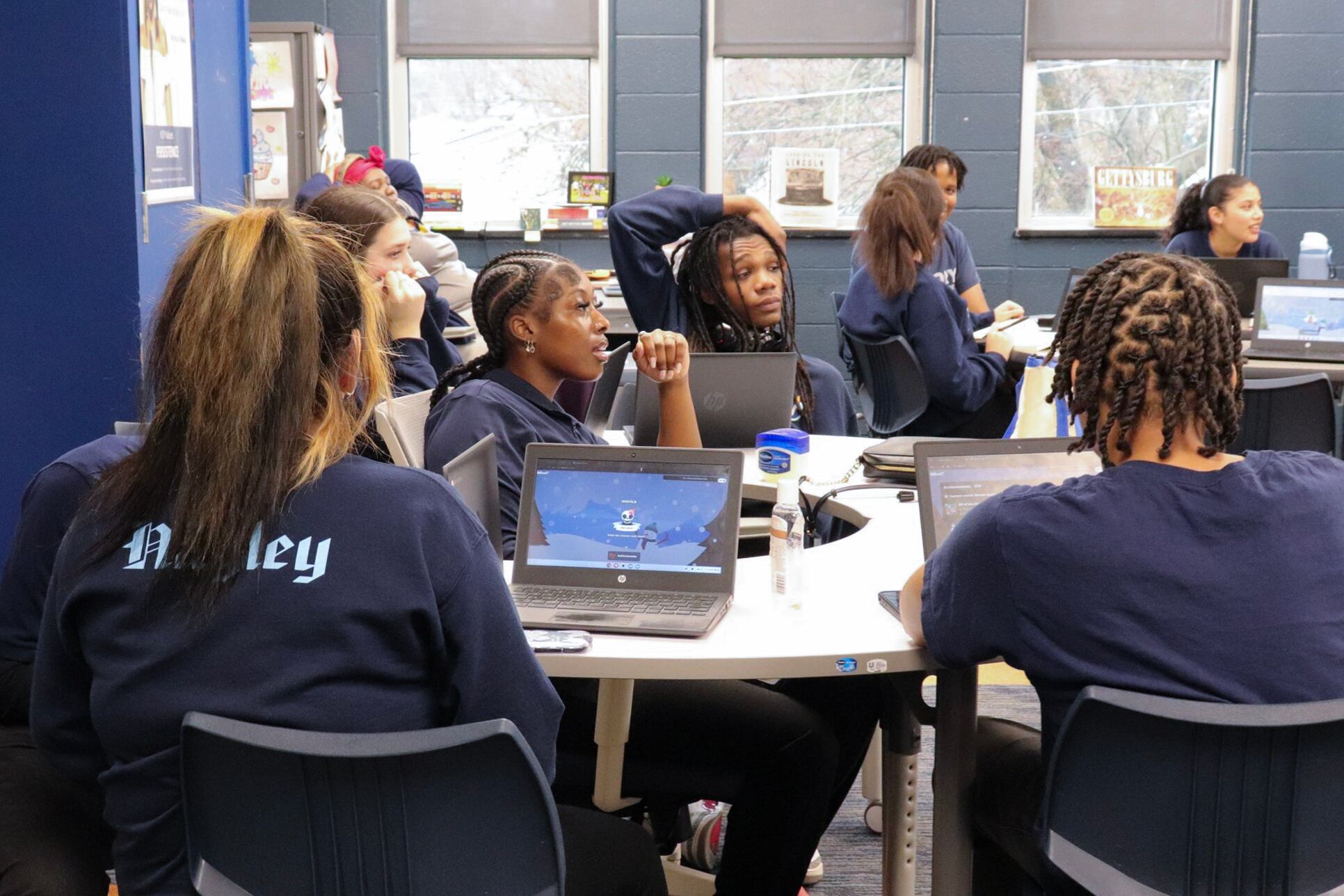Sign up for Chalkbeat Indiana’s free daily newsletter to keep up with Indianapolis Public Schools, Marion County’s township districts, and statewide education news.
This story was originally published by Mirror Indy.
Several new charter schools could open soon in Indianapolis. But first, they’ll have to get the approval of an authorizer. And authorization hearings start this month.
The hearings come at a tense time for public schools in Indianapolis. Just weeks ago, Gov. Mike Braun signed legislation requiring IPS and other traditional public school districts to share property taxes with charter schools.
The bill’s passage came following a divisive stretch of debate where parents felt compelled to testify at school board meetings and Statehouse hearings in support of their preferred schools. It also led to calls for a pause on new charter schools in the city.
All Indianapolis schools appearing before the city and state charter boards this spring seek to discuss proposals within the Indianapolis Public Schools district boundaries.
At least one school hopes to become a charter because of the new financial incentives made available by property tax sharing.
Here’s what to watch.
What is charter school authorization?
Charter schools are tuition-free, nonreligious public schools that are independent of local school districts. They’re operated by their own nonprofit boards of directors that oversee hiring and firing, curriculum approval, and the budget.
As an added layer of oversight, these schools are also responsive to an authorizer. Authorizers hold a charter contract with schools that sets targets for everything from academic progress to financial standing.
Most schools are granted a multi-year contract with opportunities to renew after several years. And authorizers generally conduct public hearings when they consider new and renewed contracts. If the authorizer feels a school is not meeting expectations, it can withdraw its support, which often leads to a school’s closure.
Most charter schools in Indianapolis are overseen by one of two charter authorizers: the Indianapolis Charter School Board and the Indiana Charter School Board.
Both have upcoming public hearings as part of their routine application cycle. These meetings offer the public a chance to learn about new school concepts in their community and to express their support or concern for charter schools in their neighborhood.
There are several applications worth watching in Indianapolis this year. They range from proposals to merge or reorganize existing schools to the formation of completely new schools.
Indianapolis Charter School Board to consider 3 applications
The Indianapolis Charter School Board is a nine-member board staffed and supported by the Indianapolis mayor’s Office of Education Innovation.
The board is made up of six mayoral appointees and three members appointed by the City-County Council.
They will meet next at 6 p.m. April 29 to hear proposals both from new and returning schools.
New schools, which have only submitted a pre-application at this point, could be invited back to present their full application in a second hearing at 6 p.m. June 24. Both meetings will be in the City-County Building, 200 E. Washington St.
Schools that have submitted materials to the city charter board this spring include:
Legal Prep Charter Academy
The founder of Legal Prep Charter Academy — a legal-themed high school in Chicago — has submitted a proposal to open a school near Monument Circle. The Indianapolis school would serve students in grades six through 12.
The school seeks to teach students core subjects alongside a law-based curriculum offering dual credit opportunities in classes like Legal Writing and Intro to Criminology. In documents submitted to the city, the school’s founder said he plans to recruit students of color from low-income backgrounds — who are generally underrepresented in the legal profession.
The school projects it will enroll between 170 and 225 students in its first year, scaling up to no more than 825 students by its fourth year. The proposed school seeks to open fall 2026, but doesn’t have an exact location yet.
School leaders are weighing possibilities downtown that would put students within walking distance of internships that leaders envision offering through partnerships with nearby legal firms. Leaders expect to have a location decided by the time they submit a full application for the city charter board’s review.
View Legal Prep Charter Academy’s pre-application here.
Indiana Math and Science Academy
Indiana Math and Science Academy is seeking to expand to a third campus near Haughville. The STEM-focused school has two campuses on the north and west sides already authorized by the Indianapolis Charter School Board.
The academy plans to serve 210 K-6 graders in its first year, adding a grade level each year after to eventually grow into a full K-12 school. It’s seeking to open by fall 2026 and its leaders have a location in mind — 2447 W. 14th St. The building, which long ago served as IPS School 75, was more recently used by Vanguard Collegiate Prep, a northwest side charter school that abruptly moved and closed two years ago due to underenrollment.
In their application, Indiana Math and Science Academy leaders said they intend to work with a charter school development facilitator who would purchase the building from its current owner and lease it back to the school. Leaders included a support letter from the building’s current owner, Centro de Avivamiento Casa de Dios y Luz para las Naciones, in their application.
The leaders addressed concern about the previous school’s underenrollment in their application. Leaders said Indiana Math and Science Academy’s STEM-friendly focus would help it stand out from established charter schools like Christel House Academy West, Allegiant Preparatory Academy and Indianapolis Metropolitan High School — all of which share the 46222 ZIP Code.
The application writers did not make note of The Match — a new charter high school and career center that’s finishing out its first year in the same neighborhood. Indiana Math and Science Academy’s parent company closed a school on the south side in 2017 due to underenrollment.
View Indiana Math and Science Academy’s charter application here.
Victory College Prep
Victory College Prep on the southeast side is applying to restructure during an expansion into a newly purchased building.
Victory College Prep’s proposal seeks to divide its existing K-12 school, which is already authorized by the city, into distinct elementary, middle, and high schools. The elementary and middle schools would operate out of Victory College Prep’s Sloan Avenue campus. The high school would move into a new space as early as this fall.
The proposal comes as part of a tense transition in which Victory College Prep made an offer in October to buy a school building that’s still being used by someone else. The school currently in the building — Bethel Park Elementary — is also a charter school that uses the city board as its authorizer.
The city authorizer, however, had concerns about that school’s finances and decided in January it would revoke its authorization at the end of the school year. Though city officials encouraged collaboration between the schools early on, Bethel Park leaders resisted what they saw as a conclusion that had already been made for them.
Victory College Prep closed its $2.8 million purchase of the Bethel Park building in February and now plans to use the building as its new high school. School leaders aim to renovate the building this summer in time to welcome high schoolers to the building this fall.
View Victory College Prep’s middle school application here and its high school application here.
Indiana Charter School Board to consider 2 applications
The Indiana Charter School Board is also a nine-member board. It’s staffed and supported by state employees.
Four members are appointed by the governor, one by Indiana’s secretary of education and four others by leaders in the Indiana General Assembly.
The board has two vacancies and appointed a new executive director in a short meeting last month.
The state board will next meet at 1 p.m. May 8 in Conference Rooms 4 and 5 in Wabash Hall of the Indiana Government Center South, 302 W. Washington St.
Two applications from the Indianapolis area appear on the board’s agenda for its May 8 meeting. Those schools include:

ACE Prep/Circle City Prep
ACE Prep, a K-6 charter school south of Broad Ripple, is seeking to merge with another charter school, Circle City Prep, a K-8 school just south of Lawrence.
Both schools share the Indiana Charter School Board as their authorizer. Circle City Prep proposes in the schools’ merger application to help ACE Prep become financially sustainable.
In its initial 2015 application to become an authorized charter school, ACE Prep proposed a K-5 school that would scale up to 432 students over five years. The school had only 129 students enrolled earlier this spring. Nearby Circle City Prep has more than 400 students.
If merged, ACE Prep would continue operating as a K-6 school under Circle City Prep’s management. ACE Prep students will be guaranteed placement for seventh and eighth grade classes at Circle City Prep’s campus near 42nd Street and Franklin Road.
View the schools’ merger application here.
Cold Spring School
Already open as a K-8 IPS Innovation School, Cold Spring School wants to transition into a charter school. The school is highly regarded for its competitive robotics team, STEM programming, and 39-acre campus near the Marian University campus.
The school has been run by a nonprofit board for the last nine years and operates with administrative independence from IPS, meaning its leaders do their own hiring and set their own lesson plans. The school does, however, operate out of a building owned by IPS and uses the district’s transportation services — both of which the school hopes to continue using after its proposed transition.
Cold Spring School leaders said in their charter application that they want to be a charter school because of the financial benefits. They project becoming a charter school could bring a $400,000 annual surplus. That’s more than the $50,000 surplus leaders say they collect under their current school structure.
In their application, submitted earlier this year, Cold Spring School leaders also cite untapped grant opportunities available only to charter schools and a desire to collect on IPS’ property tax sharing with charter schools — a hotly contested idea just made possible through a bill signed by Gov. Mike Braun on April 15.
View Cold Spring School’s charter application here.
Mirror Indy reporter Carley Lanich covers early childhood and K-12 education. Contact her at carley.lanich@mirrorindy.org or follow her on X @carleylanich.






